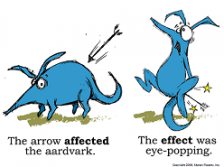We have been shaking our heads at some of the things we’ve heard and read lately in supposedly professional communications. Perhaps the end of the year is a good time to review some grammar tips. We congratulate the world on having mostly figured out there/their/they’re and it’s/its, but some fairly simple rules still seem to trip people up. Time to remedy that.
- A/an. Let your ear guide you here. Use ‘a’ before a consonant sound, ‘an’ before a vowel sound. By the way, it’s ‘a historic…’
- I/me. We find the younger among us struggle more here. Maybe they weren’t beaten over the head as much in elementary school. ‘Jane and I are going to the store.’ ‘Thank you for having Jane and me to dinner.’ If there’s any doubt, just take Jane out of the equation. You wouldn’t say ‘Thank you for having I to dinner.’

- Affect/effect. In their most common usages, ‘affect’ is a verb’ and ‘effect’ is a noun. This is a great way to remember: “The arrow affected the aardvark. The effect was eye-popping.”
- Asterisk. It’s ‘asterisk,’ not ‘asterick’ or “asterix.”
- That/which. The easiest approach here is to determine whether you need a comma. ‘Which’ is almost always preceded by a comma. The New York Times usage and style blog offers clear examples of what – and what not – to do.
- Who/whom. Use ‘who’ when referring to the subject of a sentence, ‘whom’ when referring to the object. This is another one where you can get the correct usage by turning the sentence around in your head. Ask yourself whether you’d use ‘he’ or ‘him’ in the sentence. Say the question is “Who are you having dinner with?” (We recognize it should really be, ‘With whom are you having dinner?’ But we live in the real world.) You would answer ‘him,’ not ‘he,’ so you’d use ‘whom,’ not ‘who.’
- Lie/lay. You need an object to use ‘lay,’ not so with ‘lie.’ You lay something specific down on the table. You lie down on the bed.
- Over/more than. ‘Over’ refers to spatial relationships; ‘more than’ refers to amounts. It surprises us that some guidebooks now say it’s okay to use these interchangeably. We beg to differ. “She spent more than $100 on new shoes.” “He’s over six feet tall now.”
As a bonus, our holiday gift to you is a little-known grammar rule. It makes you feel really smart, because people always get it wrong – mostly because it’s totally illogical. But here it is: in compound modifiers, adverbs ending in –ly are not hyphenated. You agree to full-time work, but you are a fully employed grammarian. Go figure.
There are many online references for grammar tips. Our favorite is Grammar Girl at QuickandDirtyTricks.com.
We resolve to make no grammatical errors in 2014! (Though we have left one case of questionable usage in this blog post. Can you find it? Leave your answers in the comments!)
Acceptional post, Karen.